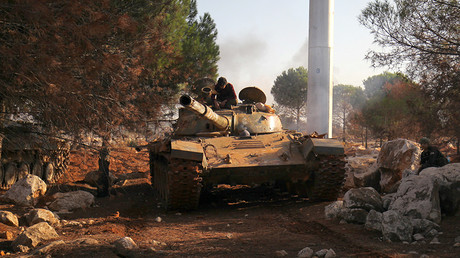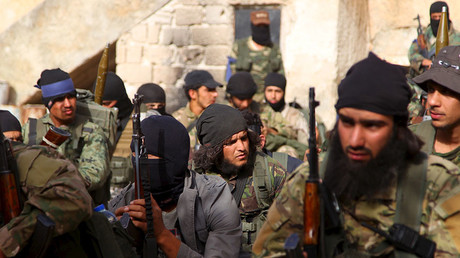'Like a Trojan Horse, Western countries delivered radical groups to Syria'
Western governments will try to avoid a probe into human rights abuses committed by rebel groups as they attack western Aleppo, Jim Jatras, former US diplomat, told RT. Dr. Said Sadiq, professor of political sociology, also joins the conversation.
The UN special envoy to Syria Staffan de Mistura said he is “shocked and appalled by the high number of rockets indiscriminately launched by armed opposition groups on civilian areas of western Aleppo in the last 48 hours.”
“Those who argue that this is meant to relieve the siege of eastern Aleppo should be reminded that nothing justifies the use of disproportionate, indiscriminate including heavy weapons on civilian areas,” Staffan de Mistura said.
The actions "could amount to war crimes," he warned.
Government-held West Aleppo has been under constant fire from the rebel-controlled East for several weeks now with many civilians, including children, falling victim to the attacks.
RT: Do you think there will be, at some point, an official investigation into human rights violations committed by rebel groups as they continue with their attacks on western Aleppo?
Jim Jatras: Well, there certainly should be and the question whether they will be is very difficult to answer because, remember, these are groups supported by the US and other Western countries and by our allies in the region - Saudi Arabia, Qatar and so forth. Despite the fact that these are terrorist groups, that they are Al-Qaeda and their various allies, and they are very reluctant to put a spotlight on the kind of people that we’re supporting in this region. Let’s remember, a couple of months ago the Al-Zinki group was alleged of using chlorine gas. And the State Department spokesman was asked, ‘if we were shown [that] they used chlorine gas, would we drop our support for them?’ And he refused to answer. So I’m afraid we’re going to see a roadblock put in by Western governments to avoid that kind of investigation.
RT: If they continue to commit what may amount to war crimes, could the rebels lose Western support? In terms of public opinion, is there any chance we'll start seeing a shift in attitude toward armed opposition groups in Syria?
JJ: It is certainly out of the bag for people who watch RT and who tune into alternative media. But as far as the American mainstream media goes, it is not out of the bag at all. You would not know from the US mainstream media that we’re supporting terrorists in East Aleppo, that it was Al-Qaeda and other groups. I would be very interested to see in the very next couple of days, will the American and other Western European mainstream media report this and pin the blame where it belongs - on these terrorists and on the governments that are supporting them.
RT: Are the attacks and potential war crimes receiving sufficient coverage to sway public opinion?
JJ: Absolutely not. These attacks are not new, these attacks against West Aleppo have been going on continuously and they receive zero reporting in the Western media. I monitor the American media pretty closely, and look at the double standards on how they report on say the offensive against Mosul versus the offensive against East Aleppo. They are night and day difference and I have not heard any reports of terrorist attacks on West Aleppo in the American media.
RT: In their latest assault, it appears the rebels used chlorine gas. Where are they likely to have acquired such weapons or the materials required for their assembly?
JJ: We’ve had a couple of instances with sarin, for example. There have been allegations in the past that this has been done inside Turkey. I am not in a position to verify that, but given that that’s the main route of the supply for the terrorists, that would be a reasonable speculation to start with.
'Western Trojan Horse'
Moderate radical groups are like a Trojan Horse that Western countries and the Gulf States put inside Syria, says Dr. Said Sadiq, professor of political sociology at the American University of Cairo.
RT: Staffan de Mistura has condemned the rebel’s actions in Aleppo. Will Western politicians and media now shift their attention to the atrocities the rebels are committing?
Dr. Said Sadiq: Despite the fact that not Mistura alone but also the UN Secretary General also condemned what is happening, but all Western media attention is going now to the battle of Mosul in Iraq and what is happening in Aleppo is being sidestepped and played down in international media…
RT: Today there was a chemical gas attack in western Aleppo. Will the West reassess its support for these so called moderate groups if it is confirmed the rebels conducted it?
SS: We have to understand that for six years, the Western countries and the Gulf States invested in those moderate radical groups and so they cannot abandon them. They are like the Trojan Horse that they had put inside the Syrian domestic situation. They cannot pull out now and say: “Okay, we discovered that we were wrong, let’s get out and leave them.” They have invested in them and they will still use them in bargaining in the future of Syria. So, if there are any future negotiations on the fate of Syria, those people, these cards of radicals and moderates will be used on the negotiating table. I don’t think that they will get rid of them soon.
Secondly, how did they get all those chemical weapons? The Gulf States provide weapons but they don’t have chemicals. So, most likely the chemical weapons had come from a NATO country. Because these are the only countries that have such kind of weapons. How did these chemical weapons come to the Syrian rebels? You will have the usual suspect –Turkey.
You would not know from the US mainstream media that we’re supporting terrorists in East Aleppo, that it was Al-Qaeda and other groups.
RT: The UK plans to launch a new program to train rebels and supply them with weapons. Last year a similar program was a complete failure and ended up with the rebels fighting alongside ISIS and Al-Nusra. Will the same happen again?
SS: Six years of wasted resources and money to destroy Syria and they failed. The objective that was declared: “We will topple the Assad regime.” Six years and nothing happened. Do you think that one more year or more investment will tip the iceberg and change what we have seen? I doubt it. I think it was wasted money and they had one strategic aim: They don’t want the gas coming from Qatar to cross Syria to Europe and also to destroy the Syrian society, not the Syrian regime, Syrian society, the Syrian army, Syrian territorial integrity.
The statements, views and opinions expressed in this column are solely those of the author and do not necessarily represent those of RT.
https://www.rt.com/op-edge/364807-syria-aleppo-chemical-attack/



0 Comments:
Post a Comment
Subscribe to Post Comments [Atom]
<< Home